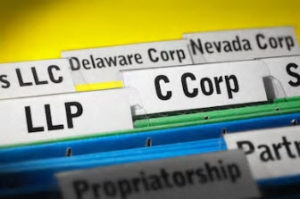
This section covers and explains the types of legal entities that exist and their main characteristics. There are hundreds of pages related to this topic, some of them are harder to understand. We tried to explain this very simple and easy to understand.
Main characteristic of different legal entities.
Investors, venture capitalists and financial institutions will want to know that you have a corporation that is active and properly protected from potential lawsuits. You will need to make sure your entity is 100% bullet proof when it comes to protection, and especially when you plan on raising investment capital. Let’s look at the most commonly used legal entities today.
C Corporation
- You can sell unlimited number of shares.
- Taxes start at 15%.
- You can have an IPO in the future – optional.
- Double taxation.
- If an employee has more than 2% of the shares of the company, they are no longer considered an employee of your company. Importance of keeping all the records.
- It is important to note that you have the same right and tax benefits than Bill Gates. Make sure you take full advantage of all of the benefits out there.
- C Corp does have a lot of tax advantages over other entities.
S Corporation is one of the oldest corporations.
- Some people consider it to be a smaller version.
- With a S Corp. – liability is limited to corporate asset, which means if somebody files a lawsuit, the only thing, they can get is the asset inside of that entity.
- There is no such a thing as double taxation.
- You are only liable for what’s inside of that entity.
- S Corp can only have one type of shares. 100 – therefore it is easier to navigate.
- S Corp also has a lot of tax benefits.
- S Corp has a Board of Directors.
LLC – Limited Liability Company  fairly young introduced in the late 90s.
- LLC can have foreign members & owners (great entity for someone with international investors).
- You are only liable for what’s inside of that entity.
- There are no shareholders and no stock certificates.
- Offers the same level of protection.
- In most states, you do not have to have board of directors, you can be the only member, responsible to everything. VP, CEO, CFO, Administrative Assistant.
- You have to keep up with the minutes even if there is one person. Must keep the records.
- Your children can be members of your LLC Corporation which creates a lot of benefits.
Note: Importance of keeping up with minutes. Do not underestimate the importance of keeping up with minutes. If someone sues you and you do not have minutes in place, the judge may easily gear in favor of your opposition because you are not acting like a real business. There are a lot of tax benefits of having multiple entities.
Sole Proprietorship
- No Tax Benefits.
- Do not recommend if you are trying to raise investment capital from VC, angel investors, etc. Simply because that is similar as giving out money to an individual.
- On a personal note, I recommend having one on a shelf since there are no costs associated with maintaining it and it may come in handy when you least expect it for unspecified reasons.
Note: Click here to see the tax bracket for each of these entities.
